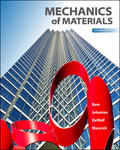
Concept explainers
Two cover plates are welded to the rolled-steel beam as shown. Using E = 29 × 106 psi, determine (a) the slope at end C, (b) the deflection at end C.
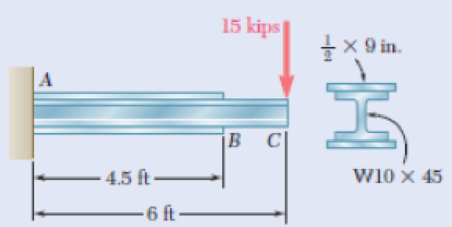
Fig. P9.108
(a)
Find the slope
Answer to Problem 108P
The slope
Explanation of Solution
Given information:
The elastic modulus (E) is
The section of the beam is
The dimension of the top plate and bottom plate is
Calculation:
Refer Appendix C, “Properties of Rolled steel shapes”.
The moment of inertia (I) for the given section is
The depth of the section (D) is
The width of the section (b) is
Use moment area method:
Consider from bottom.
Calculate the neutral axis
Substitute
Top plate:
Calculate the area of the top plate
Since the dimension of the top plate is
Calculate the depth of neutral axis (d) using the formula:
Substitute
Calculate the product of
Substitute
Calculate the moment of inertia (I) using the formula:
Here, b is the width the top plate and h is the height of the top plate.
Substitute
Bottom plate:
Top plate:
Calculate the area of the bottom plate
Since the dimension of the bottom plate is
Calculate the depth of neutral axis (d) using the formula:
Substitute
Calculate the product of
Substitute
Calculate the moment of inertia (I) using the formula:
Here, b is the width the top plate and h is the height of the top plate.
Substitute
Tabulate the calculated values and compute the moment of inertia (I) as in Table (1).
| Segments | Area, A | Depth, d (in.) | ||
| Top plate | 4.5 | 5.3 | 126.405 | 0.09375 |
| 248 | ||||
| Bottom plate | 4.5 | 5.3 | 126.405 | 0.09375 |
| Summation | 252.81 | 248 |
Take the greater value of moment of inertia from the three segments is
Calculate the moment of inertia (I) using the relation:
Substitute
Show the free body diagram of beam by considering the point load as in Figure 1.
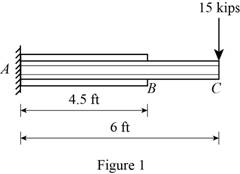
Draw the moment diagram of the above beam as in Figure 2.
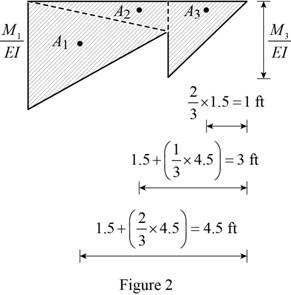
Calculate the moment
Calculate the ratio of
Substitute
Calculate the area
Here,
Substitute 4.5 ft for
Calculate the area
Substitute
Calculate the moment
Calculate the ratio of
Substitute
Calculate the area
Here,
Substitute 1.5 m for
Show the tangent slope and deflection at point C related to reference tangent as in Figure 3.
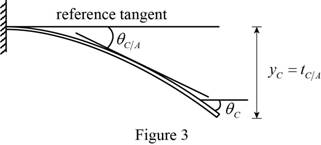
Since the support A has fixed support, the slope
Calculate the slope at the end C related to the fixed end A
Substitute
Calculate the slope at the point C
Substitute 0 for
Thus, the slope
(b)
Find the deflection
Answer to Problem 108P
The deflection
Explanation of Solution
Given information:
The elastic modulus (E) is
The section of the beam is
The dimension of the top plate and bottom plate is
Calculation:
Calculate the deflection at end C related to the fixed end A
Substitute
Calculate the deflection at the point C
Substitute 0 for
Thus, the deflection
Want to see more full solutions like this?
Chapter 9 Solutions
EBK MECHANICS OF MATERIALS
- Q10) Body A weighs 600 lb contact with smooth surfaces at D and E. Determine the tension in the cord and the forces acting on C on member BD, also calculate the reaction at B and F. Cable 6' 3' wwwarrow_forwardHelp ارجو مساعدتي في حل هذا السؤالarrow_forwardQ3: Find the resultant of the force system.arrow_forward
- Question 1 A three-blade propeller of a diameter of 2 m has an activity factor AF of 200 and its ratio of static thrust coefficient to static torque coefficient is 10. The propeller's integrated lift coefficient is 0.3.arrow_forward(L=6847 mm, q = 5331 N/mm, M = 1408549 N.mm, and El = 8.6 x 1014 N. mm²) X A ΕΙ B L Y Marrow_forwardCalculate the maximum shear stress Tmax at the selected element within the wall (Fig. Q3) if T = 26.7 KN.m, P = 23.6 MPa, t = 2.2 mm, R = 2 m. The following choices are provided in units of MPa and rounded to three decimal places. Select one: ○ 1.2681.818 O 2. 25745.455 O 3. 17163.636 O 4. 10727.273 ○ 5.5363.636arrow_forward
- If L-719.01 mm, = 7839.63 N/m³, the normal stress σ caused by self-weight at the location of the maximum normal stress in the bar can be calculated as (Please select the correct value of σ given in Pa and rounded to three decimal places.) Select one: ○ 1. 1409.193 2. 845.516 O 3. 11273.545 ○ 4.8455.159 ○ 5.4509.418 6. 2818.386 7.5636.772arrow_forwardTo calculate the rotation at Point B, a suitable virtual structure needs to be created. Which equation in the following choices most accurately represents the functional relationship between the bending moment, Mv2 ( Units: N.mm), of the virtual structure and the spatial coordinate x (Units: mm) if the applied unit virtual moment is clockwise? Select one: O 1. Mv2 1.000 O 2. Mv2=x+1.000 O 3. Mv2=x+0.000 4. Mv2 = -x-1.000 O 5. Mv2 -1.000 6. Mv2=-x+0.000arrow_forwardThe vertical deflection at Point B can be calculated as ( The following choices are provided in units of mm and rounded to three decimal places ; the downward deflection is negative and upward deflection is positive. ) Select one: 1. 1703.065 2. -1703.065 3. -2043.679 4.1362.452 5. -1362.452 6. 2043.679arrow_forward
 Elements Of ElectromagneticsMechanical EngineeringISBN:9780190698614Author:Sadiku, Matthew N. O.Publisher:Oxford University Press
Elements Of ElectromagneticsMechanical EngineeringISBN:9780190698614Author:Sadiku, Matthew N. O.Publisher:Oxford University Press Mechanics of Materials (10th Edition)Mechanical EngineeringISBN:9780134319650Author:Russell C. HibbelerPublisher:PEARSON
Mechanics of Materials (10th Edition)Mechanical EngineeringISBN:9780134319650Author:Russell C. HibbelerPublisher:PEARSON Thermodynamics: An Engineering ApproachMechanical EngineeringISBN:9781259822674Author:Yunus A. Cengel Dr., Michael A. BolesPublisher:McGraw-Hill Education
Thermodynamics: An Engineering ApproachMechanical EngineeringISBN:9781259822674Author:Yunus A. Cengel Dr., Michael A. BolesPublisher:McGraw-Hill Education Control Systems EngineeringMechanical EngineeringISBN:9781118170519Author:Norman S. NisePublisher:WILEY
Control Systems EngineeringMechanical EngineeringISBN:9781118170519Author:Norman S. NisePublisher:WILEY Mechanics of Materials (MindTap Course List)Mechanical EngineeringISBN:9781337093347Author:Barry J. Goodno, James M. GerePublisher:Cengage Learning
Mechanics of Materials (MindTap Course List)Mechanical EngineeringISBN:9781337093347Author:Barry J. Goodno, James M. GerePublisher:Cengage Learning Engineering Mechanics: StaticsMechanical EngineeringISBN:9781118807330Author:James L. Meriam, L. G. Kraige, J. N. BoltonPublisher:WILEY
Engineering Mechanics: StaticsMechanical EngineeringISBN:9781118807330Author:James L. Meriam, L. G. Kraige, J. N. BoltonPublisher:WILEY





